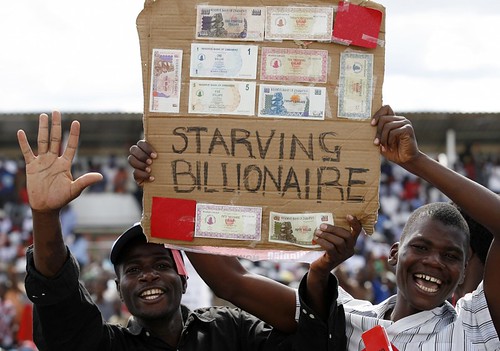
PREV ARTICLE
NEXT ARTICLE
FULL ISSUE
PREV FULL ISSUE
ZIMBABWE COMPLETING PHASING OUT OF ITS OLD CURRENCY
Philip Mernick forwarded this BBC News article. Thanks. -Editor
Zimbabwe is phasing out its local currency, the central bank says, formalising a multi-currency system introduced during hyper-inflation. Foreign currencies like the US dollar and South African rand have been used for most transactions since 2009. Local dollars are not used except high-denomination notes sold as souvenirs. But from Monday, Zimbabweans can exchange bank accounts of up to 175 quadrillion (175,000,000,000,000,000) Zimbabwean dollars for five US dollars. Higher balances will be exchanged at a rate of Z$35 quadrillion to US$1. The highest denomination was a $100 trillion Zimbabwean dollar note. A four-year unity government, that ended in 2013 with President Robert Mugabe's re-election, helped stabilise the economy but it still faces huge challenges. One of the problems has been the shortage of coins that kept prices high as retailers often rounded them up and shoppers were given change in sweets or pens. Over the last six months, the central bank has introduced about $10m (£6.4m) worth of "bond coins" into circulation, but they have not been popular with consumers who fear that it is the first step in the re-introduction of the Zimbabwe dollar. To read the complete article, see:
Here's the Associated Press take on the topic, about the souvenir value of the hyperinflation notes. -Editor
Zimbabwe in 2009 abandoned its currency for a system dominated by the U.S dollar and the South African rand after inflation hit 230 million percent. Back then, even street hawkers refused to accept a $100 trillion dollar note that was issued. Starting Monday, stacks of Zimbabwean bills that might still be kept by Zimbabweans can be exchanged for U.S dollars. The offer is part of what the central bank says is an overdue plan to phase out the currency entirely. Some people in Harare, Zimbabwe's capital, said they disposed of their Zimbabwean dollars long ago. "I used it as garden manure," said Isaac Mutezowepasi, a street vendor. "Why would I have kept that dirt?" Others said they still have heaps of old dollar notes at home, but won't respond to the government offer. "I am keeping them for my grandchildren to see. Plus I know I will get more for them in future because these Zimdollars are going to be in demand," said Tendai Nyaundi, a graphic designer. On e-Bay on Friday, five banknotes of 100 trillion Zimbabwean dollars were being sold for $159. Another e-Bay post put five banknotes of $100 trillion at $173.99. To read the complete article, see:
John Mutch sent this story from PRI. -Editor
Although people have primarily been using the US dollar for years, many have been holding on to their Zimbabwean dollars, partly because there has been uncertainty as to whether or when there might be a return to the Zimbabwean dollar. Chitiyo says one big reason for the Central Bank's move is to reassure people that the Zimbabwean dollar is not about to return any time soon. 
Thanks also to Kavan Ratnatunga and others who alerted me to this story. -Editor
To read the complete article, see:
Wayne Homren, Editor The Numismatic Bibliomania Society is a non-profit organization promoting numismatic literature. See our web site at coinbooks.org. To submit items for publication in The E-Sylum, write to the Editor at this address: whomren@gmail.com To subscribe go to: https://my.binhost.com/lists/listinfo/esylum All Rights Reserved. NBS Home Page Contact the NBS webmaster 
|